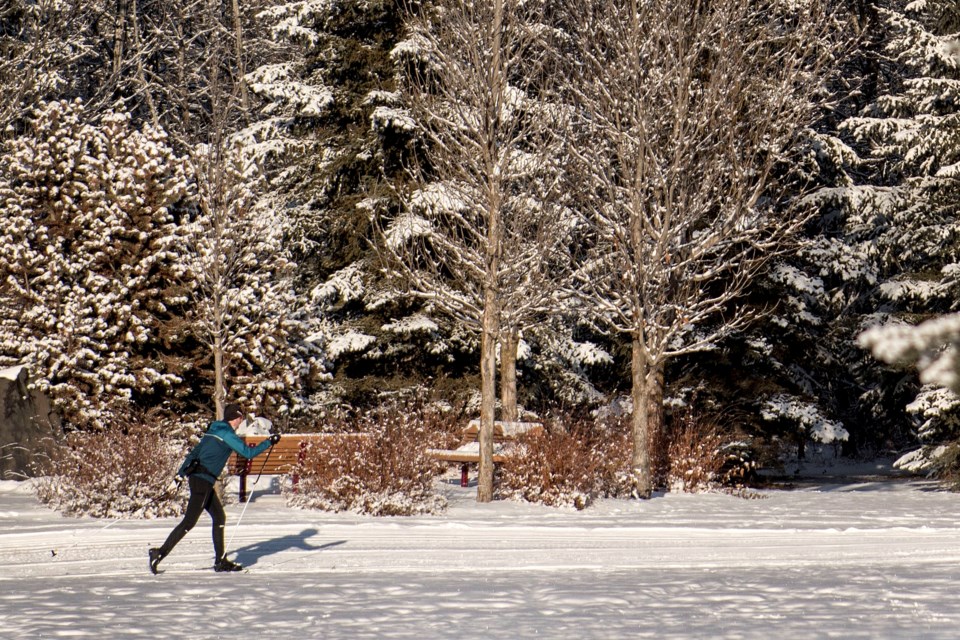Living with a pandemic the last eight months has been tough, but getting through the cold, dark, snowy days of winter may be tougher.
Public health officials, backed by scientific research, say socializing outdoors reduces the risk of spreading COVID-19 and is one way people have been coping with the isolation of the pandemic. That becomes more difficult when the weather becomes less hospitable, said University of Alberta infectious disease expert Dr. Lynora Saxinger, co-chair of the COVID-19 Scientific Advisory Group to Alberta Health Services.
"I think people are seeing (winter) with some trepidation and I can understand that because I do too. I'm thinking, 'Oh man, this is going to be a real grind,' and it really will be because thinking about maintaining sustainable habits to protect yourself and finding ways to do things so it's not so demoralizing, but still getting some social input and building it into what you're doing so you don't slip up, is a bit of a daunting task," Saxinger said.
"To me, the most constructive way to approach it is to think of it in chunks."
Here are Saxinger's 11 tips to help get you through to spring:
1) "Think about what activities you like to do in the winter (skiing, skating, tobogganing), and how you can engage in them and socialize and still keep warm, Build them into your schedule so you don't reach that point of isolation and depression," she advised.
2) There are things to be learned from other people who live in northern climates and how they make their cities winter cities. "Make outdoor spaces more hospitable for people to gather even in difficult weather. I've seen some images of winter city-type events where people are actually putting out heaters and bonfires ... so that you can interact outside with less discomfort.
"I did try to buy myself a patio heater the other day and they were all sold out," Saxinger added, laughing, "so I took too long on that."
3) Take advantage of being a dog owner, if you are one. Follow the lead of apartment dwellers who have to walk their dogs every day, which is good for dog and owner. Don't just let your pets out into the backyard to do their business.
4) Keep the focus on spending time in the outdoors in a healthy way by following such basic principles as dressing in layers so that you can maintain more outdoor activities than usual in fall and winter.
5) You'll be spending more time indoors so "try to improve the environmental characteristics for transmission." Manipulate your space to maintain social distancing of two metres, wear masks and sanitize your hands.
6) Turn up the humidity at home. It's not yet clear how much being in indoor spaces and the drier air that comes with winter affects the transmission of COVID, but it does improve the environment.
7) Socialize safely indoors. Christmas can be saved ... maybe. Critically think when you're planning activities to maximize safety. "Think about who's going to be at the event and if they have excess risks, but I think there is a place between doing it all and doing nothing. We're just trying to find the right spot in there using the principles we've already figured out from this disease. We have the advantage of knowing more at this stage of the pandemic than we did early on," Saxinger said.
"If there's a family event that you really want people to gather for and you think it's a reasonable thing to do, have everyone basically lock down (or limit contact with new people) for two weeks before it, have the event, and basically avoid any other group events for another two weeks after that. If you can't avoid a certain amount of contact, having Christmas dinner with Grandma might be a bad idea."
8) Make plans so you always have something to look forward to. "No one is going to be risk free in this world, but you can try and minimize the risk. Identify things that are really important to you ... and actually map out a plan to do some of these things semi-regularly so you're breaking up the tedium of everyday life somewhat."
9) When you can't meet face-to-face, take advantage of virtual reality. "Feed your soul and reduce your isolation in the safest way possible" with something as simple as having a glass of wine on Zoom with a friend, something that is very good for mental health."
10) Think outside the box. Explore new things like public education type events offered online or find or create communities, especially if you're elderly, that involve some socialization and/or an activity like a virtual indoor exercise class, something that has accountability to it, that has other people involved, because I think that is a big risk for people going into winter."
11) Look for opportunities that help other people and look for things to be grateful for instead of complaining about what the pandemic has taken away. "Social isolation impacts health and increases the risk of death. A lot of people don't have anyone looking out for them that are close, (their families are far away), and identifying people that are at risk and reaching out to offer them anything ... can be motivating and helpful to people in their own mental being as well as others. It also makes you happier than buying a lot of things."



